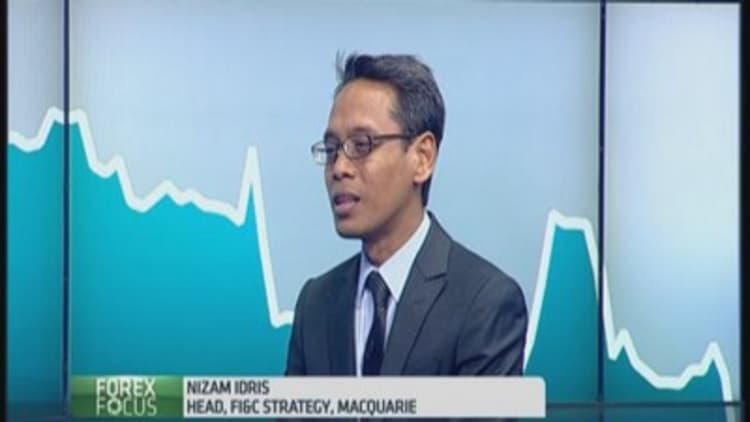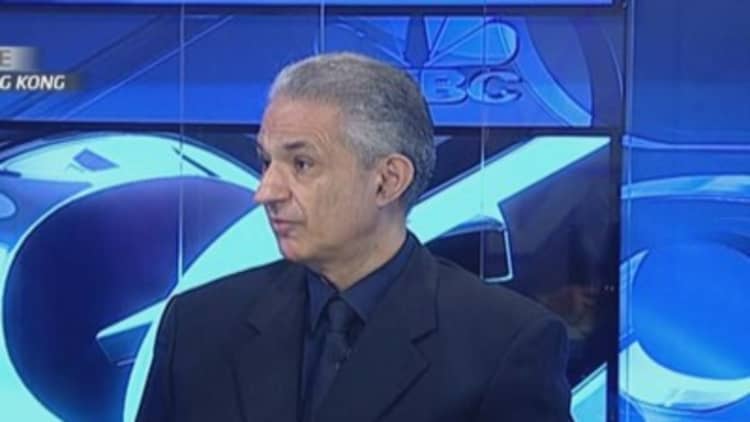The persisting turmoil in commodity markets ignited risk aversion in most Asian stock markets on Wednesday, with Tokyo and Sydney equities finishing at fresh lows.
Overnight, U.S. stocks settled modestly lower, reversing earlier gains of over 1 percent as materials and energy shares fell on lower commodity prices. The Dow Jones Industrial Average fell 0.2 percent, after a near 300-point rally. The S&P 500 shed 0.3 percent, while the tech-heavy Nasdaq declined 0.1 percent.
Also contributing to the risk-off sentiment is news that the World Bank lowered its global growth forecast for 2015 and 2016 late Tuesday. The global development leader predicted the global economy would grow 3 percent this year, lower than the 3.4 percent forecast it made in June, with disappointing economic prospects in the euro zone, Japan and some major emerging economies likely to offset the benefit of lower oil prices.
Oil prices slid in early Asian trade on Wednesday, after touching their lowest in nearly six years in the previous session and as the Brent crude international benchmark briefly trading at par to U.S. prices for the first time in three months.
Nikkei skids 1.7%
Hurt by a stronger currency, Japan's Nikkei 225 index closed trade at its lowest levels in nearly a month on Wednesday. The U.S. dollar was fetching less than 117.1 yen at the end of the day, compared with 117.8 at Tuesday's close.
As a result, exporter stocks were the hardest-hit. Electronics like Sony, Nintendo and made losses between 4.3 and 2.2 percent while automakers such as Toyota Motor and Suzuki Motor closed down nearly 2 percent, respectively. Honda, meanwhile, bucked the downtrend to notch up 0.5 percent.
Index heavyweights Softbank and Fast Retailing were also down 2.6 and 3.8 percent respectively. The latter was in focus after its clothing brand, Uniqlo, came under fire for poor working conditions in its Chinese factories.
Meanwhile, Japanese Prime Minister Shinzo Abe's cabinet approved on Wednesday a record $812 billion budget for the fiscal year starting on April 1, while cutting new borrowing for a third straight year in a bid to balance growth and fiscal reform.
Read MoreFor Japan, cheaper oil is a catch 22

ASX falls 1%
Australia's benchmark S&P ASX 200 index widened losses to settle at a near one-week low, chalking up a third straight decline this week, as weakness in commodity-related sectors weighed on the resource-heavy bourse.
As iron ore fell below $70 a tonne, big miners languished; Fortescue Metals led declines with a nearly 9 percent slump, while Rio Tinto and BHP Billiton finished 3.3 and 2.8 percent lower, respectively.
Oz Minerals and PanAust saw sharp losses of 12 and 10 percent each after benchmark three-month copper on the London Metal Exchange hit its weakest since July 2009. As the price of copper sank, the latter announced late Wednesday that it is reducing 5 percent of its workforce, mostly employed at its copper mine in Laos.
There were a few bright spots, however. Santos outperformed fellow energy producers to rise 2 percent after its chief executive signaled that asset sales are being considered amid slumping oil prices. Whitehaven Coal got a boost from news that it achieved record coal sales in the three months to December 31. Shares of the miner advanced 1.3 percent.
Meanwhile, the fall in copper prices also took a hit on the Australian dollar, which fell nearly 1 percent to a near one-week low, fetching $0.8095 against the U.S. dollar late Wednesday.
Read MoreAussie dollar to keep falling - but how much further?
Mainland indices down
China's Shanghai Composite index erased gains to turn lower in the afternoon session amid the depressed mood in Asian markets, while the blue-chip CSI300 index ended the day 0.3 percent lower.
Among losers, energy plays struggled on the back of the prolonged oil rout; PetroChina and China Oilfield Services closed down nearly 3 percent each.
Fortunately, the banking sector capped losses on the bourse, with Bank of China rising 3.6 percent, Bank of Communication and China Construction Bank piling on nearly 3 percent each while China Merchants Bank tacked on 1.9 percent.
In Hong Kong, the key Hang Seng index also reversed gains to inch down 0.4 percent following an annual policy speech by the city's chief executive CY Leung, who addressed issues on political reform and housing.
Hence, property plays were in focus; Wheelock and Sun Hung Kai Properties were down 2 and 1.5 percent each while Cheung Kong Holdings lost 0.6 percent.
Yashili International, a unit of China Mengniu Dairy, recouped losses to climb up 0.9 percent on Wednesday despite warning that its 2014 annual profit was expected to fall about 40 percent. Shares of China Mengniu Dairy pulled back 1 percent.

Kospi loses 0.2%
South Korea's benchmark Kospi reversed early gains to finish modestly lower, while the junior Kosdaq index held on to a 0.6 percent gain.
Automakers remained in focus, with Hyundai Glovis plummeting over 9 percent, extending Tuesday's steep decline of 15 percent, on reports that the automaker's chairman and vice-chairman failed to sell a $1.25 billion stake sale in the logistics arm of Hyundai Motor.
Hyundai Mobis and Hyundai Steel tanked 4 and 1.7 percent each despite speculation that these two companies will benefit from the ownership structure reforms at Hyundai Group. Shares of Hyundai Motor erased early gains to recede 1.1 percent.
LG Display, which was in the news after being ordered by South Korea's labor ministry to stop operations at an organic light-emitting diode (OLED) panel production line due to a nitrogen gas leak, closed up 2.8 percent. Analysts' expectations for record fourth quarter profits buoyed sentiment for the stock.
By late Wednesday, the South Korean won bought 1,081 against the greenback, after hitting a 9-month high of 1,075 won earlier in the session.
Read MoreWill Bank of Korea surprise with rate cut?
EM Asia
India's Nifty index sagged 0.3 percent after data showed December's wholesale price index (WPI) increasing 0.11 percent, snapping a six-month easing trend as food costs jumped up year-on-year.
In the Philippines, the benchmark Philippine-Psei index leapt over 1 percent to an all-time high of 7,490 points.

